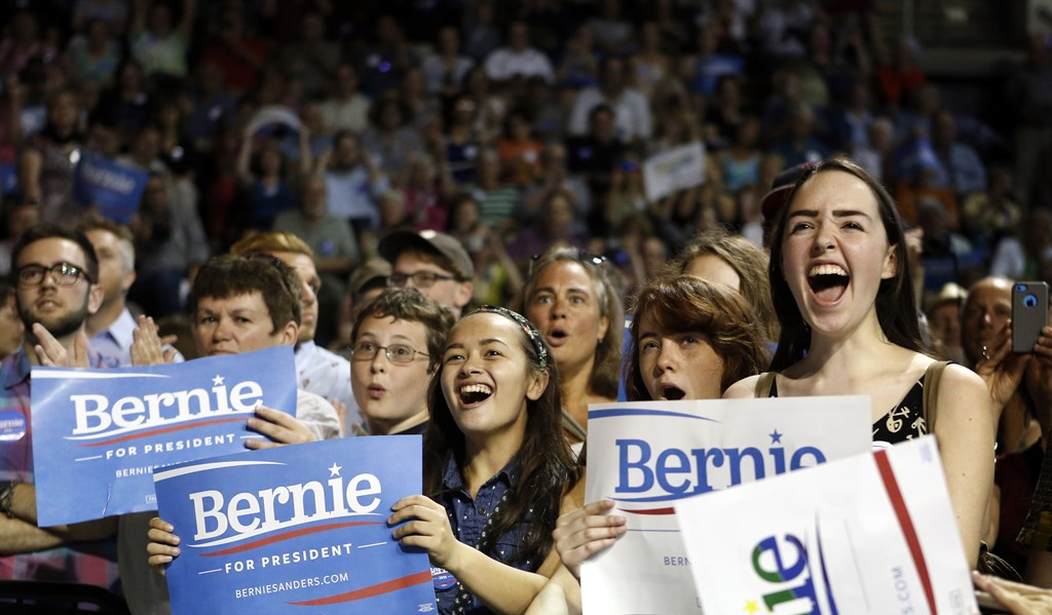For liberal voters feeling the Bern, you should (if you’re a Democrat) congratulate one another. You have made Sen. Bernie Sanders (I-VT) the official anti-Clinton candidate in the 2016 Democratic primary. He was once down by nearly 50 points in New Hampshire, now he’s trailing Clinton by only ten. His events are getting more attendees than that of the former first lady, and you have collectively given him a $15 million war chest. Not bad for someone who was thought to not have a chance in hell in this race, right? Well, actually, Sanders still doesn’t have much of a chance of beating Hillary–and that will become apparent when the “rank and file” of the Democratic Party begin to pay attention, according to The New York Times’ Nate Cohn.
In a previous post, I mentioned how Cohn noted how the Democratic Party’s elite is very liberal, and receptive to the politics of Sanders. Yet, a large portion of the Democratic Party primary electorate does contain large swaths of voters that Cohn describes as “less educated, more religious … older, Southern, or nonwhite.” In other words, they’re not a slam-dunk for Sanders.
Mr. Obama beat Mrs. Clinton in 2008 in large part because he prevented her from running up the score among moderates, who voted for her by 5 percentage points.There were two types of these voters who allowed Mr. Obama to stay so close to Mrs. Clinton, and Mr. Sanders doesn’t naturally appeal to either one.
First, Mr. Obama did well among moderates in affluent and well-educated areas, often with the help of self-described independents and Republicans. Nationally, Mr. Obama won independents by 12 points and Republicans by 8 points. Second, he won more than 80 percent of black voters, perhaps the least liberal demographic group in the Democratic Party.
In Iowa and New Hampshire, where Mr. Obama fought Mrs. Clinton to a draw among moderates, Mr. Sanders still trails among moderates by an average of 27 points, her 50 percent to his 23 percent.
…
It is even harder to imagine how Mr. Sanders could replicate the strength among black voters that was essential to Mr. Obama’s success. Mr. Sanders has struggled to inch out of the single digits among nonwhite voters in national surveys.
As a result, there has been plenty of commentary about Mr. Sanders’s challenge among nonwhite voters.
But his problem with nonwhite voters is not properly understood as simply a problem of race. It’s primarily a problem with moderate and less educated Democrats, regardless of race, which happens to disproportionately affect his support among nonwhite voters.
Recommended

For now, the Sanders coalition tends to be comprised of very liberal, white voters. He’s surging in Iowa and New Hampshire because both states are full of them, and his name recognition is high. So, when the Clinton campaign tells the media that they could lose Iowa and not do so hot in New Hampshire, they’re probably right, but as FiveThirtyEight’s Nate Silver noted–Sanders could win both states and "lose everywhere else." Regardless, the result is the same–the Bern is over. Silver, like Cohn, also noted Sanders’ weak support among nonwhite Democrats:
In the chart below, I’ve listed the share of Democratic voters who identified as liberal, and as white, in the 39 states where the networks conducted exit polls during the 2008 Democratic primaries. Then I’ve multiplied the two numbers together to estimate the share of Democrats in each state who were both white and liberal.
I estimate that 54 percent of the voters in the New Hampshire Democratic primary were white liberals in 2008. That’s the second-highest figure in the country,2 after Vermont (59 percent). In the Iowa caucus, meanwhile, white liberals made up 50 percent; that put the state in a tie with Massachusetts for the third-highest percentage.
The percentage of white liberals isn’t so high in other early primary states, however. It’s just 29 percent in Nevada and 19 percent in South Carolina. The percentage is also low in high-population, delegate-rich states like California (26 percent) and Texas (17 percent).
Put another way, Iowa and New Hampshire aren’t representative of the more diverse electorates that Democrats will turn out elsewhere. It just so happens that the idiosyncrasies of the first two states match Sanders’s strengths and Clinton’s relative weaknesses.
At the same time, Cohn did note that very liberal voters still view Clinton overwhelmingly in a positive light, and these folks are surely going to back her once she pushes Sanders aside in the coming months. That’s a process that will only be accelerated if Sanders doesn’t make serious inroads in the nonwhite–and more moderate–Democratic enclaves. For now, the consensus is that the candidate who can siphon votes away from the moderate wing of Clinton’s coalition is the one who should be viewed seriously concerning the long game.
…the only candidates who could threaten Mrs. Clinton’s path to the nomination would be ones who could break her grip on the party’s moderate wing.That’s why John Edwards, a liberal Southerner who appealed to progressive activists and white conservatives, and Mr. Obama, the first black candidate with a serious chance of winning the nomination, posed such serious threats to her in 2008. So far, Mr. Sanders does not.
So, does this mean Jim Webb has an opening? Well, first he needs to get more aggressive, enlarge his name ID, and raise a boatload of cash.























Join the conversation as a VIP Member